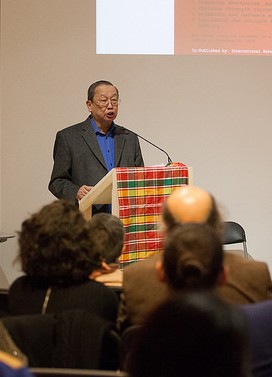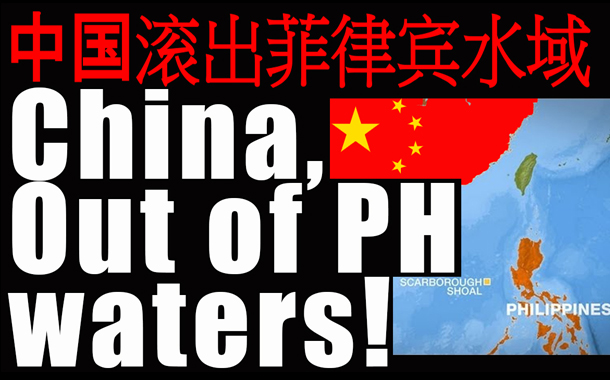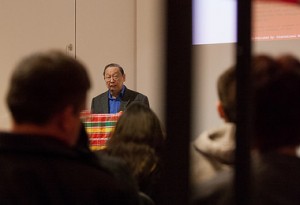
By Prof. Jose Maria Sison
Chairperson, International League of Peoples’ Struggle
June 10, 2015
In viewing the maritime dispute between the Philippines and China, the International League of Peoples’ Struggle (ILPS) takes a position in the light of and within the framework of the UN Convention on the Law of the Sea (UNCLOS). The International Tribunal on the Law of the Sea (ITLOS) is expected to make a decision concerning the rights of the Philippines under the UNCLOS.
The Philippines is entitled to the interconnectivity of its islands, the territorial sea of 12 nautical miles from its eastern, northern, western and southern shorelines, the further 200 nautical miles of exclusive economic zone (EEZ) and the still further 150 nautical miles of extended continental shelf (ECS) from the outer limits of the EEZ.
 China has its own territorial sea, EEZ and ECS and these are hundreds of miles away from what lawfully belongs to the Philippines. The invention of such a name as “South China Sea” by Western cartographers and mariners cannot be the lawful basis of China’s drawing its nine-dash line and claiming “indisputable sovereignty” over 90 per cent of the said sea as much as India cannot claim ownership over the Indian Ocean.
China has its own territorial sea, EEZ and ECS and these are hundreds of miles away from what lawfully belongs to the Philippines. The invention of such a name as “South China Sea” by Western cartographers and mariners cannot be the lawful basis of China’s drawing its nine-dash line and claiming “indisputable sovereignty” over 90 per cent of the said sea as much as India cannot claim ownership over the Indian Ocean.
It is an act of piracy and aggression for China to rob the Philippines of 100 per cent of its extended continental shelf and 80 per cent of its exclusive economic zone. It has in fact enforced control over Bajo de Masinloc (or Panatag Shoal) and made reclamations on seven reefs in the Kalayaan group of islands (Spratlys) in what is precisely the West Philippine Sea. It has forcibly acted against Filipino fishermen, damaged the marine environment, grabbed the marine and other resources and installed military facilities in the area.
China has become a full-fledged imperialist power by its acts of aggression on the basis of its monopoly capitalist character that resulted from the Dengist anti-socialist counterrevolution soon after the death of Mao. It is foolish for anyone to misrepresent such aggressive acts as lawful acts to assert the “indisputable sovereignty” of China or even as political counters to US efforts to continue and aggravate US imperialist hegemony over the Asia-Pacific region through its so-called pivot to East Asia.
The imperialist policies of both the US and China are hostile and inimical to Philippine national sovereignty and territorial integrity. There are indeed inter-imperialist contradictions between the US and China. But they also cooperate in order to maintain amicable relations at the expense of the Philippines and the Filipino people.
 In connection with the maritime dispute between China and the Philippines, the US has expressed neutrality and interest only in its freedom of navigation. It has overlooked China’s violations of the UNCLOS and has in fact shown partiality to its larger interests in relations with China than in those with the Philippines. The US pivot to East Asia is mainly intended to aggrandize US interests and to favor the pro-US big bourgeoisie in China.
In connection with the maritime dispute between China and the Philippines, the US has expressed neutrality and interest only in its freedom of navigation. It has overlooked China’s violations of the UNCLOS and has in fact shown partiality to its larger interests in relations with China than in those with the Philippines. The US pivot to East Asia is mainly intended to aggrandize US interests and to favor the pro-US big bourgeoisie in China.
The US has taken advantage of the maritime dispute between the Philippines and China and has further entrenched itself in the Philippines in many ways, especially militarily by reestablishing military bases under the Enhanced Defense Cooperation Agreement (EDCA) and selling military junk to the Philippines directly or through Japan and Israel. It is clear that the US and China are conniving by a significant measure to dominate and divide the Philippines, very much like the time when China was divided into spheres of influence and Anglo-American and Japanese imperialists at certain times competed and collaborated in dividing and dominating China.
In the Philippines, regimes subservient to the US and other imperialist powers have pretended to stand for Philippine national sovereignty and territorial integrity against China. But they have in fact allowed the Chinese state and private enterprises to plunder the natural and human resources and to exploit a wide range of business opportunities at the expense of the Filipino people and Filipino entrepreneurs who uphold political and economic sovereignty and desire national industrialization.
 On a global scale, the ILPS has been observant of the growing contradictions between the US-NATO combine and the Russia-China tandem. These contradictions have an inter-imperialist character. At certain times, we like to see the Russia-China tandem opposing the US-NATO combine because the latter is more covetous and more aggressive, besides having a longer history of modern imperialist hegemony and aggressions. But we cannot allow China to do its own aggression against the Philippines and the Filipino people just as we cannot allow the perpetuated aggression of the US against them.
On a global scale, the ILPS has been observant of the growing contradictions between the US-NATO combine and the Russia-China tandem. These contradictions have an inter-imperialist character. At certain times, we like to see the Russia-China tandem opposing the US-NATO combine because the latter is more covetous and more aggressive, besides having a longer history of modern imperialist hegemony and aggressions. But we cannot allow China to do its own aggression against the Philippines and the Filipino people just as we cannot allow the perpetuated aggression of the US against them.
The people and their revolutionary forces must rise up against the imperialist powers and their local reactionary agents. They must advance in their struggle for national liberation, democracy and socialism. They must end their intolerable suffering of the escalating oppression and exploitation, the ever worsening crisis, depression and wars.
They must take advantage of the opportunities generated by inter-imperialist contradictions. The oppressed and exploited peoples can achieve national and social liberation by relying on their own strength and capabilities and by fighting against any imperialist power and local reactionary force that oppress and exploit them.
Liberation cannot be achieved by being subservient to one or another imperialist power. The broad masses of the Filipino people, including the revolutionary party of the proletariat and people’s army, can demand the nationalization of the enterprises of any imperialist power hostile to the Filipino people. They can also immediately strive to disable and dismantle the enterprises of any hostile imperialist power even if they cannot as yet wage naval, air and missile warfare.
The anti-imperialist and democratic forces in the Philippines should unite to build national strength and develop relations with friendly countries that are truly helpful and are not hostile to the Filipino people’s aspirations for full national sovereignty, people’s democracy, industrial development, social justice, scientific and cultural progress and peace.###